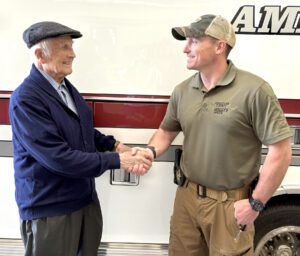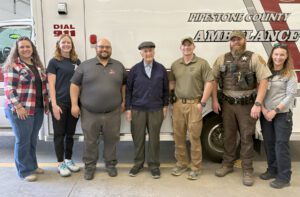|
|

Alan Mitchell shakes hands with Sgt. Investigator Paul Mathews of the Pipestone County Sheriff’s Office. Mathews was the first emergency responder on the scene and administered cardiopulmonary resuscitation after Mitchell experienced cardiac arrest in March. Contributed photo
On March 31, Alan Mitchell, of Flandreau, was driving home from Balaton after visiting the dentist. He remembers getting on state Highway 23 and then waking up at Pipestone County Medical Center (PCMC). The 94-year-old former Pipestone resident said recently that he still has no recollection of what happened in between.
“I’m amazed that I could get that far without knowing at all or remembering it,” Mitchell said recently.
According to an incident report from the Pipestone County Sheriff’s Office, a 911 call was received 3:01 p.m., after someone saw Mitchell unconscious near the gas station side of Coborn’s in Pipestone. It was unclear if he was breathing.
Sgt. Investigator Paul Mathews, of the Pipestone County Sheriff’s Office, was the first person to arrive on the scene at 3:04 p.m. Mathews saw Mitchell on the sidewalk by the east exit door when he arrived. He was lying on his back, his face was blue, he was not breathing and he had no pulse. Mathews removed Mitchell’s upper layers of clothing to expose his chest, put an automated external defibrillator (AED) from his squad vehicle on him and administered cardiopulmonary resuscitation (CPR) chest compressions until the Pipestone County Ambulance arrived.
Pipestone County Emergency Medical Services Director Casey Sievert said she was part of the ambulance crew that responded. She said they took over CPR, put a machine that provided chest compressions and a cardiac monitor on Mitchell, and dressed wounds caused by his fall.
Sievert said Mitchell’s breathing and pulse had returned before they left the scene to take him to PCMC. Mitchell’s daughter Debbie Pulscher, who described what happened to her father as “extremely traumatic,” said he spent quite a while in the emergency room at PCMC and then spent two weeks recovering there and another week at a nursing home in Flandreau.
It’s not clear what caused Mitchell to lose consciousness, but Sievert said video from outside Coborn’s showed that he appeared to be experiencing some kind of medical event when he arrived there because he was stumbling and appeared confused before he fell.
Mitchell said on May 15 that he was doing well, but had some broken ribs, possibly from the CPR, that make it hurt when he coughed or sneezed. He said that was expected to be better in about a month. He also said he’s decided to stop driving after the incident.
Mitchell, who spent much of his life as a missionary, said that as a believer, he knows that God is ultimately in control and that He must still want him here on earth. He also said he was very thankful that people responded quickly, which could have made the difference between life and death.
Mathews and Sievert shared the same sentiment, saying that having someone call 911 right away and being able to get to the scene and start CPR as quickly as possible was crucial.
“It’s circulating blood, it’s circulating oxygen to the brain, to the tissues,” Sievert said.
They said it’s rare for someone experiencing full cardiac arrest, meaning that their heart has stopped, to survive.
“Truly with any cardiac arrest, all the stars have to align to have an outcome like we did,” Sievert said. “I can think of three within the past probably five years that we have had return of spontaneous circulation and one was just like this one where the deputy initiated CPR and he had gotten a pulse back just by doing compressions by the time that EMS got there.”

Alan Mitchell (center) stands with local emergency responders who helped save his life after he experienced cardiac arrest in March. Pictured (l-to-r) are Danielle Thompson, Amy Erks, Christopher Amen, Mitchell, Sgt. Investigator Paul Mathews, Deputy Tony Sievert and Emergency Medical Services Director Casey Sievert. Contributed photo
Mathews said it was the first time he’s done CPR on someone and the individual has made a full recovery. He said it feels good to have played a role in saving someone’s life.
“That is why we do the job, to help people,” Mathews said. “It’s awesome to have a positive outcome for his daughter and his family.”
Sievert said ambulance personnel are often involved in situations that don’t have positive outcomes and seeing a situation that ends in a positive way keeps them going.
“It’s just incredibly rewarding and fulfilling to see positive outcomes,” Sievert said.
Pulscher said she’s thankful to still have her father and expressed her gratitude for all those who helped him and have shown care and concern for him.


